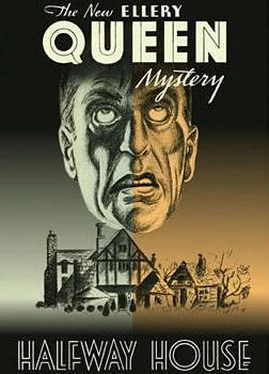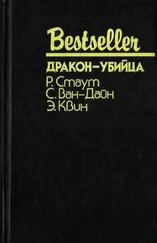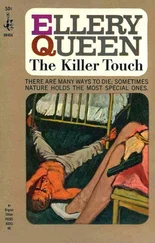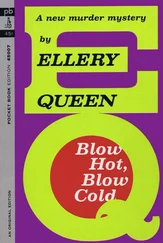“The problem that naturally arises is: Despite Finch’s protestations to the contrary, did he really tell someone else of the change of beneficiary, thus placing another person in possession of the vital clue? I will ignore the fact that Finch, in insisting that he did not, made the most damaging statement possible under the circumstances, since he was virtually naming himself, and himself alone, as the sole possessor of the vital knowledge. Had he been conscious of the implications, he certainly would have managed to tell someone else, just to spread the possibilities of guilt.
“But even if you choose not to believe him, whom could he theoretically have told? A woman? Mrs. Gimball — the then Mrs. Gimball, for example? But as a woman she is eliminated from suspicion; the criminal was a man. Had she told another woman in turn, this other woman would be eliminated for the same reason. Had she told another man, or had Finch told another man directly, then we merely have to see if that man, or any man involved in the case, fits the characteristics of the criminal as we have now developed them. Well, what happens? There is no man except Finch who fits those characteristics completely. So, by a circuitous route, we arrive at the conclusion that Finch told no one; or if he did, his telling had no bearing on the murder as it subsequently developed.
“What followed I have already reconstructed: his suspicions, his probable secret visit to Philadelphia, his discovery of the background, his discovery of Halfway House, his plan for the crime and frame-up, and so on.”
“The masquerade, of course,” muttered Pollinger, “was necessary.”
“Oh, yes. If Lucy was to seem to have committed the crime, there must be evidence that a woman drove her coupé. The veil, of course, he had to use to mask his masculine features, and naturally he couldn’t speak to the garageman that evening because his voice would have given the masquerade away. As I pointed out once before, he deliberately stopped for gas there to leave an open trail to Lucy! Not being a lawyer, he didn’t realize how flimsily circumstantial a case he was weaving about her; if he hadn’t luckily found that paper-cutter and Lucy hadn’t handled it the night before in her home I don’t doubt that she would have been acquitted.”
“Without the fingerprint evidence I should have thrown the case out at the first motion for dismissal by defense counsel,” said the Judge, shaking his head. “As a matter of fact, even with that evidence the case was weak — I beg your pardon, Paul, but I think you realize that, too. It was a poor jury, I’m afraid. It all came down to a matter of believing Mrs. Wilson, and why they didn’t believe her story I don’t know to this day.”
“The stout lady,” said Ellery darkly. “Well, that may be as it may be, but there’s the story. No magic now, eh, Your Honor? Just common sense. I shouldn’t explain how I do these things; it disillusions people.”
The two New Jersey lawyers laughed; but Bill was suddenly very serious. He gulped twice and then said in a formal voice, “Judge Menander, sir—”
“One moment, Mr. Angell.” The old jurist leaned forward. “It seems to me, Mr. Queen, you’ve left something out. How about explaining away that weakness I pointed out some time ago? You worked on the ‘assumption’, you said, that Miss — may I call you Andrea, my dear? — that Andrea had told you the truth about the matches and so on. What right,” he asked severely, “did you have to assume any such thing? I thought you work strictly by rule of established fact. If the young woman had told a lie, the entire structure of your solution would have collapsed.”
“The legal mind,” chuckled Ellery. “How I enjoy discussing these things with lawyers! Perfectly true, Judge. It would have collapsed. But it didn’t, because Andrea told the truth. I knew she had told the truth when I reached the end of my mental journey.”
“That’s a bit over my head,” said Pollinger. “How the devil could you have known that?”
Ellery patiently lit another cigaret. “Why should Andrea have lied? It could only have been because she herself had killed Gimball and meant to confuse the trail.” He waved the fuming cigaret about. “But what did her lie, if it was a lie, lead to? It led to the guilt of Grosvenor Finch. How silly! For if she were the real criminal, she had originally framed Lucy Wilson for the crime! And where was Lucy Wilson? In prison, convicted of the crime. The frame-up of Lucy, then, had been successful from Andrea’s point of view if Andrea were herself the criminal. Now when did she tell her lie which led me to the guilt of Finch? After Lucy Wilson’s conviction! So I say: would she invalidate her successful frame-up of one person by then framing another person entirely? Unthinkable, of course. And even if in telling the lie she didn’t know where it would lead, why should she lie at all if she had killed Gimball and framed Lucy? Her crime was safely committed; her victim, her living victim, was safely convicted. There would be utterly no point in a further confusion of the trial. So I knew that Andrea was telling the truth.”
“I’ll bet,” said Andrea, “that you’d suspect your own father!”
“That was meant,” grinned Ellery, “as a spiteful remark, but it turns out to be a shrewd guess. As a matter of fact, I investigated a crime some time ago in which that very thing happened: all the logic pointed to my father, Inspector Queen, as the criminal! Well, I had a time of it, you may be sure.”
“What happened?” asked Judge Menander eagerly.
“That,” said Ellery, “is another story.”
“You’re not finished with this one yet,” said Pollinger with a certain humorous grimness. “I don’t like to appear pernickety, but it seems to me if the fact that Finch knew about the insurance change was so vital to your solution, you haven’t exactly shone, Queen. After all, you knew that Finch knew that from the very beginning of the case.”
“Oh, Lord,” groaned Ellery. “Why did I ever choose lawyers as an audience? Clever, Pollinger, very astute indeed. But you’ve missed the point. Finch’s knowledge of the change of beneficiary had utterly no significance until the case with its various deductions had been completely developed. The fact meant nothing to me until I proved by logic that the criminal had to know of the beneficiary change. I couldn’t know that the criminal had to know until I’d made all the preliminary deductions. The thing that told me that the criminal had to know of the beneficiary change was that the criminal knew of Gimball’s double life. The thing that told me that the criminal knew of Gimball’s double life was that he had deliberately framed Mrs. Wilson. The thing that told me that the criminal had framed Mrs. Wilson was that Mrs. Wilson was innocent because the criminal was a man. Without all those steps the final fact would have meant nothing.”
“QED,” said Bill hastily. “Swell. Great. Bravo . Judge Menander—?”
“What is it, young man?” said the old gentleman a little testily. “If you’re worried about that insurance, I can promise you there will be no hitch in the proceedings. Your sister will be paid the full amount of the policy.”
“No, no, Judge,” stammered Bill, “It’s not—”
“I don’t want that money,” said Lucy simply; she had stopped crying. “I wouldn’t touch it for...” She shuddered.
“But, my dear child,” protested Judge Menander, “you must take it. It’s yours. It was the will of the deceased that you should have it.”
Lucy’s black eyes, shadowed and tired as they were, managed a sudden smile. “You mean it’s mine — to do with as I wish?”
Читать дальше












